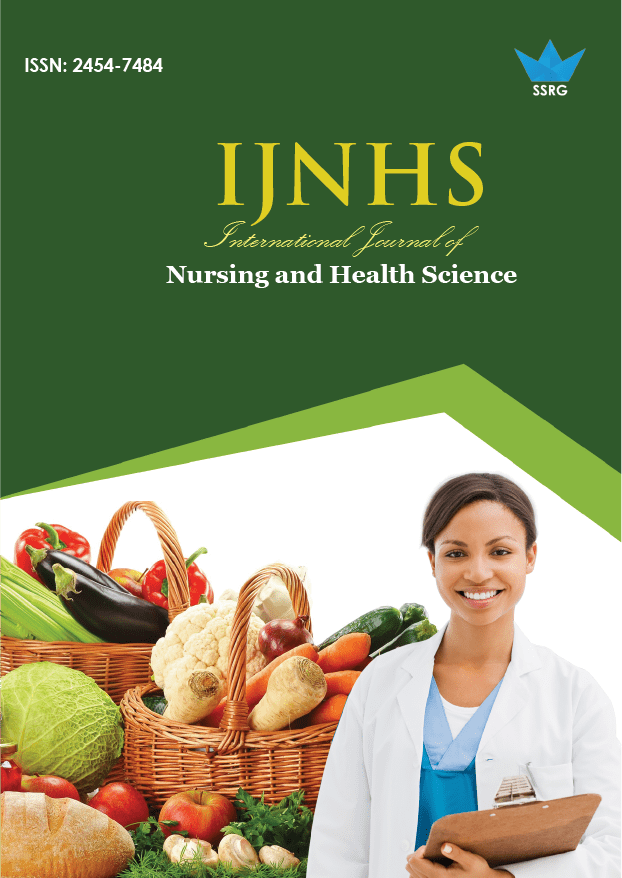A Prospective Observational Study of Cardiac Safety, Adverse Drug Reactions And Its Management of Adriamycin + Cyclophosphamide Regimen In Breast Cancer Patients

| International Journal of Nursing and Health Science |
| © 2020 by SSRG - IJNHS Journal |
| Volume 6 Issue 1 |
| Year of Publication : 2020 |
| Authors : Dr. K.Velavan, M.D., RT, G.Saravanan, M.SC, PGDCR, V.Lalitha M.Pharm, Syam Prakash K.R.Pharm D, Maheshwari V Pharm D, Nithin Joseph Pharm D |
How to Cite?
Dr. K.Velavan, M.D., RT, G.Saravanan, M.SC, PGDCR, V.Lalitha M.Pharm, Syam Prakash K.R.Pharm D, Maheshwari V Pharm D, Nithin Joseph Pharm D, "A Prospective Observational Study of Cardiac Safety, Adverse Drug Reactions And Its Management of Adriamycin + Cyclophosphamide Regimen In Breast Cancer Patients," SSRG International Journal of Nursing and Health Science, vol. 6, no. 1, pp. 28-34, 2020. Crossref, https://doi.org/10.14445/24547484/IJNHS-V6I1P104
Abstract:
This study aims to evaluate cardiac safety, adverse drug reactions, and its management of the Adriamycin+Cyclophosphamide regimen in breast cancer patients. 33 female breast cancer patients enrolled in the study and assigned to the treatment with Adriamycin, Cyclophosphamide, followed by monitoring the cardiac safety analysis, A.D.R., and its management assessed. This study observes that the main way to prevent cardiac toxicity is to limit the cumulative dose of drugs that damage the heart, especially the anthracyclines. There is a defined amount of doxorubicin that can be given with a lesser risk of complications. If the total dose of doxorubicin is less than 550mg/m2, there is a 20 % chance of cardiac toxicity. If the full dose of doxorubicin is between 560-1155mg/m2, the risk increases to 30%.
Keywords:
Adriamycin, Doxorubicin, Cyclophosphamide, A.C. regimen, breast cancer
References:
[1] Adriana A, Giuseppina P, Francesco D, Rosaria C, Silvio DF, et al ., Cardiotoxicity of Anticancer Drugs: The Need for Cardio-Oncology and Cardio-Oncological Prevention, J Natl Cancer Inst, (2010)14-25.
[2] Asif U, Yousaf M, Saleem Z, Raza SA, Iftikhar N et al ., Assessment of C.B.C. Changes in Breast Cancer Patients Following Treatment with 5-Flourouracil, Adriamycin and Cyclophosphamide (FAC-Protocol) and Adriamycin and
Cyclophosphamide (AC-Protocol). Medwin, (2017) 196-218.
[3] Benjaminn K, Umberto C, Ana B.Cardiovascular side effect in cancer patients under anthracycline-based chemotherapeutic regimen, The pharmaceutical journal, (2016) 815-832.
[4] Chung WB, Joeng EY, Jung YJ, Yun SC, Chan SP, et al., Early Cardiac Function Monitoring for Detection of Subclinical Doxorubicin Cardiotoxicity in Young Adult Patients with Breast Cancer, J Breast Cancer, (2013) 178-183.
[5] Dhanya SP, Bindhu LN, Jayakumar K.L., Ramani P. Comparative study of the toxicity of 5-fluorouracil-adriamycin-cyclophosphamide versus adriamycin-cyclophosphamide followed by paclitaxel in carcinoma breast. Indian J Cancer, 48 (2011) 68-73.
[6] Elizabeth TC, Greg Y, Edward R, Charles E, Geyer JR, et al., Assessment of cardiac dysfunction in a randomized trial comparing doxorubicin and cyclophosphamide followed by paclitaxel, with or without trastuzumab as adjuvant therapy in node-positive, human epidermal growth factor receptor 2-overexpressing breast cancer: NSABP B-31, J Clin Oncol, (2005) 7811-7819.
[7] Iarussi D, Indolfi P, Casale F, Coppolino P, Tedesco MA, et al., Recent advances in the prevention of anthracycline cardiotoxicity in childhood, Curr Med Chem, 13 (2001)1649-1660.
[8] Kuraparthy S, Reddy KM, Yadagiri LA, Yutla M, Venkata P.B., et al., Epidemiology and patterns of care for invasive breast carcinoma at a community hospital in Southern Indiam, World J Surg Oncol, (2007) 5-56.
[9] Maria F, Mircea C, Dragos V. Chemotherapy-induced Cardiotoxicity. Maedica ,(2013) 59-67.
[10] Nabholtz JM, Mackey JR, Smiley M, Paterson A, Noel DR, et al., Phase II study of docetaxel, doxorubicin, and cyclophosphamide as first-line chemotherapy for metastatic breast cancer. J Clin Oncol, (2001) 314-321.
[11] Ng R, Better N, Green MD. Anticancer agents and cardiotoxicity. Semin Oncol. (2006) 2-14.
[12] Raschi E, Vasina V, Ursino MG, Boriani G, Martoni A, et al., Anticancer drugs, and cardiotoxicity: Insights and perspectives in the era of targeted therapy, Pharmacol Ther, (2010) 196-218.

 10.14445/24547484/IJNHS-V6I1P104
10.14445/24547484/IJNHS-V6I1P104